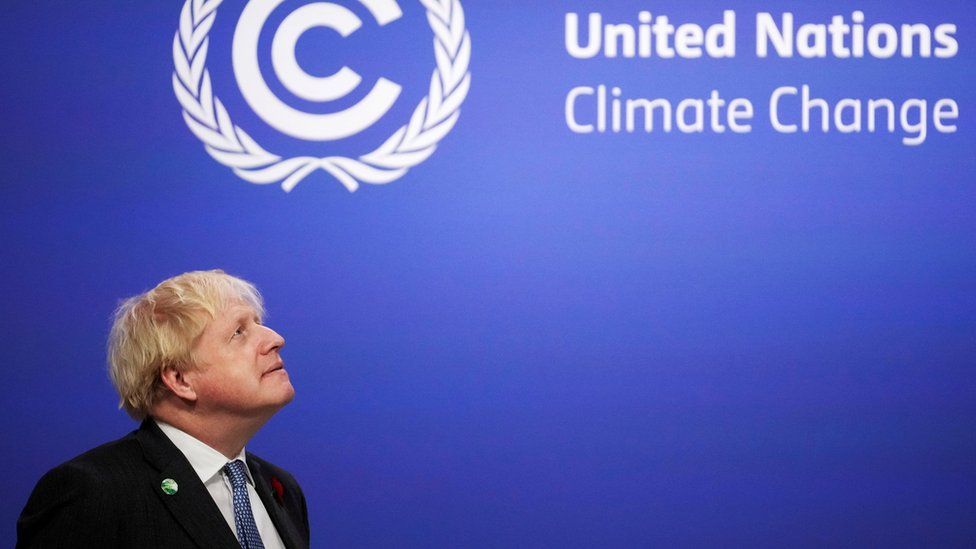COP26: PM calls on nations to pull out the stops as draft agreement published
- Published

Prime Minister Boris Johnson is returning to the COP26 climate summit in Glasgow - urging nations to "pull out all the stops" to limit warming.
The first draft of an agreement setting out how countries will cut emissions to avoid temperature rises of above 1.5C has been published.
The agreement - or "cover decision" - sets out what negotiators hope will be the outcome of the COP26 talks.
It encourages richer countries to scale up support for poorer nations.
The seven-page draft agreement focuses on adaptation - helping countries deal with the effects of climate change - and finance, a controversial issue because poorer countries blame richer countries for not contributing enough.
The document says meeting the goal to limit global warming to 1.5C - which countries pledged to try to pursue under the Paris climate accord - needs meaningful and effective action in "this critical decade".
The agreement, which was published by the UK Cop26 presidency, will have to be negotiated and agreed by countries attending the talks.
Scientists have warned that keeping temperature rises to 1.5C - beyond which the worst impacts of climate change will be felt - requires global emissions to be cut by 45% by 2030 and to zero overall by mid-century.
The document may be just seven pages long but it attempts to steer COP26 towards a series of significant steps that will prevent global temperature rises going above 1.5C this century.
Perhaps the most important part of that is getting countries to improve their carbon cutting plans.
To that end this draft decision urges parties to "revisit and strengthen the 2030 targets in their nationally-determined contributions, as necessary to align with the Paris Agreement temperature goal by the end of 2022".
It will be interesting to see how countries such as China, India, Brazil and Saudi Arabia respond to this request to put new plans on the table by the end of next year.
There is some comfort for developing countries to see that their financial needs are recognised as countries are asked to mobilise climate finance "beyond $100bn a year" and the draft welcomes steps to put in place a much larger, though as yet unspecified, figure for support from 2025.
Loss and damage, an issue of key importance to the developing world, is included in the draft with encouragement to richer countries to scale up their action and support including finance for poorer nations.
The document also calls on countries to accelerate the phase out of coal and subsidies for fossil fuels - but has no firm dates or targets on this issue. Campaigners will welcome the inclusion and will hope it survives into the final text.
Despite the promises made at the summit so far, the planet is still heading for 2.4C of warming above pre-industrial levels, according to a report by Climate Action Tracker.
A global average temperature rise of just 2C could mean a billion people are affected by fatal heat and humidity, the Met Office has warned.
Ahead of his return to the summit, Mr Johnson said: "Negotiating teams are doing the hard yards in these final days of COP26 to turn promises into action on climate change. There's still much to do."
The prime minister said he would be meeting ministers and negotiators to hear about the progress made and where gaps must be bridged.
"This is bigger than any one country and it is time for nations to put aside differences and come together for our planet and our people," he said.
"We need to pull out all the stops if we're going to keep 1.5C within our grasp."
A coalition of nations which are vulnerable to climate change, along with the US and European nations, is pressing for countries to submit action plans in the next year in line with limiting warming to 1.5C, and by 2023 to produce their long-term plans to meet the target.
What has been agreed so far at COP26?
The summit is still negotiating a deal that all 197 countries will agree on. But a series of side deals were announced last week:
- More than 100 world leaders promised to end and reverse deforestation by 2030, including Brazil, home to the Amazon rainforest
- The US and the EU announced a global partnership to cut emissions of the greenhouse gas methane by 2030 - reducing methane in the atmosphere seen as one of the best ways to quickly reduce global warming
- More than 40 countries committed to move away from coal - but the world's biggest users like China and the US did not sign up
- Some new pots of money were announced to help developing countries adapt to climate change and deal with the damage and loss it brings - but many say it's not enough
With Wednesday named as transport day at COP26, the UK announced that new heavy goods vehicles sold from 2040 will need to have zero emissions.
Thirty countries have agreed to work together to increase the use of zero emissions vehicles, while plans for "green shipping corridors" to help a shift towards zero-emissions vessels are also due to be unveiled.
Another 14 states which are responsible for more than 40% of global aviation emissions have committed to a new decarbonisation target.
But the UK's Transport Secretary Grant Shapps said travel, including flying, should be "guilt-free" and said the government did not see aviation as "the ultimate evil".
He told the Daily Telegraph that changes to how we live our lives should not mean "the inability to go and visit you friends and family and do business".
Attendees at COP26, including the prime minister, have faced criticism for using planes for short journeys to and from the conference.
Related Topics
- Published9 November 2021
- Published8 November 2021
- Published8 November 2021